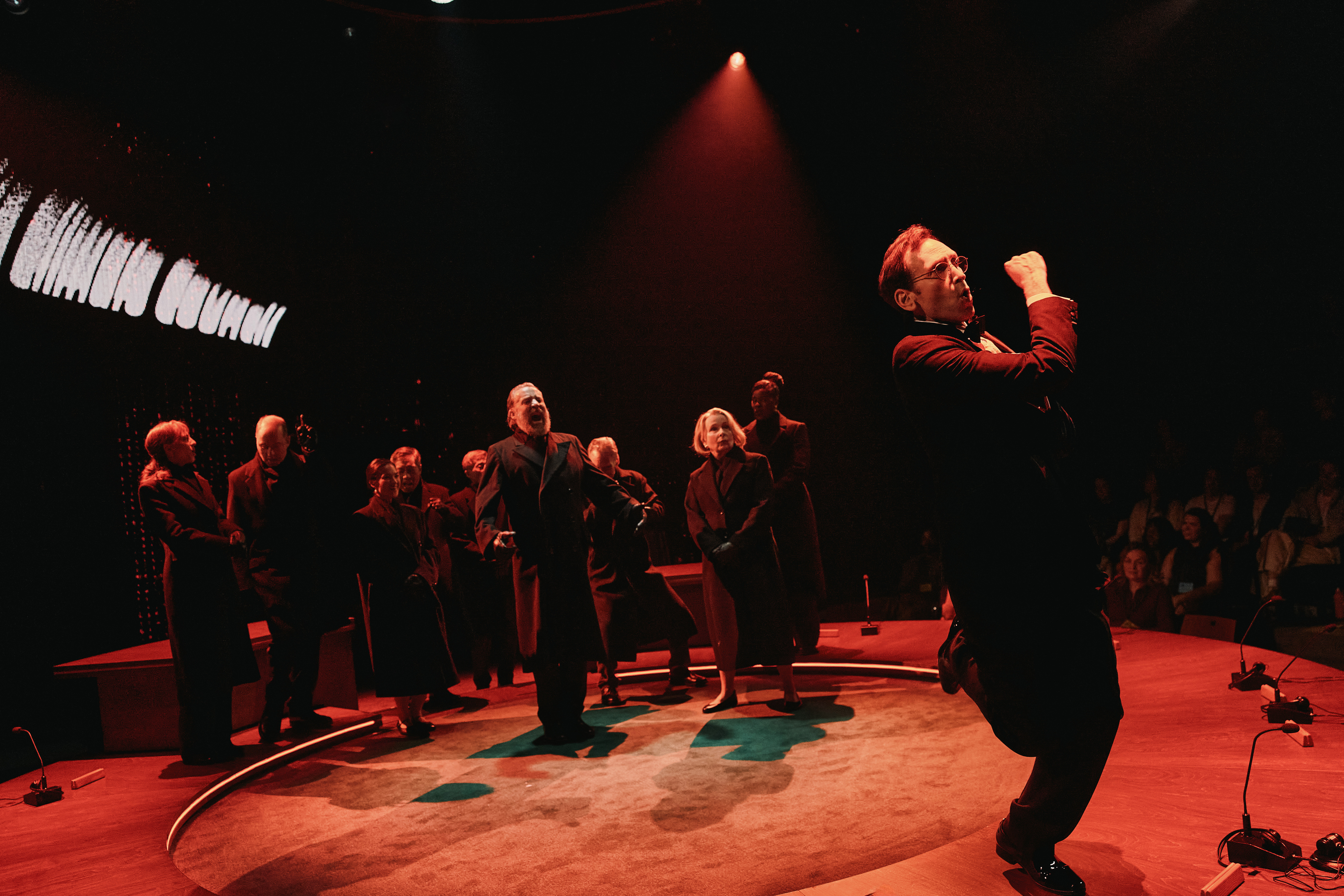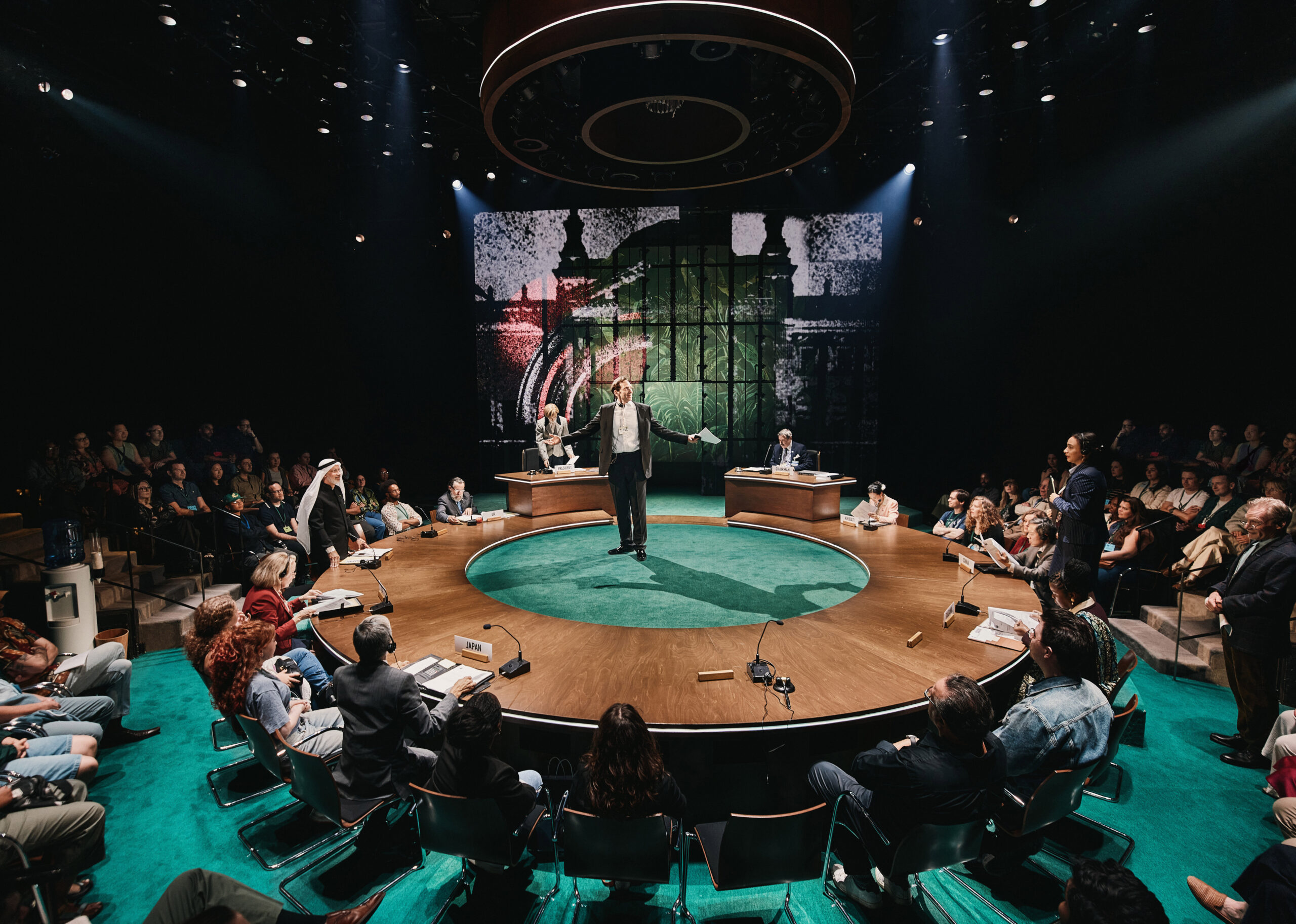Review by Ron Fassler . . .
While sitting through Kyoto, which opened this week at the Mitzi Newhouse Theatre, I couldn’t help being reminded of several other recent plays best described as chewy, meaty morsels of political food. There has been J.T. Rogers’ Oslo, the Tony Award winner for Best Play (2017), and Ayad Akhtar’s Junk which, like Kyoto, also came that same year from Lincoln Center Theatre. In fact, LCT seems to have cornered the market in this arena, especially when you add to the mix Robert Schenkkan’s The Great Society (2019), Sylvia Khoury’s Power Strip (2019), and Mario Correa’s N/A – The Play (2024). Successfully pulling off shows like these so as to not promote indigestion isn’t easy. But when done right (and Kyoto gets the job done) it’s usually due to feisty, kinetic staging and trusting in audiences to follow things without having to spoon feed any of it. This approach has always worked for me, especially when applied to television series like Aaron Sorkin’s West Wing, which was famous for dropping viewers into a scene without knowing exactly what was going on, forcing a game of catch up. With Kyoto, Joe Murphy and Joe Robertson provide a crash course in global environmentalism over a two-hour-forty-minute running time. That may feel intimidating going in, but upon exiting the theater, I found it a rich experience of political theatre offering much food for thought (and that’s it for all the nutrition imagery).
The Joes, as Murphy and Robertson are known, are a playwriting team who created a juggernaut with The Jungle, a play that depicted the conditions of a refugee camp in the Calais jungle, located in the vicinity of Calais, France. Starting first in London, it came to Brooklyn’s St. Ann’s Warehouse in December 2018, opening to exceptionally good reviews and strong business. Kyoto reunites the Joes with co-directors Stephen Daldry and Justin Martin, as well as scenic designer Miram Buether, and it too began in England. Reprising his role from the Royal Shakespeare Company production is Stephen Kunken, an American actor best known as Ari Spyros on Showtime’s Billions. No stranger to political theatre, he received a Tony nomination for Lucy Prebble’s Enron, in which he gave a haunting performance as Andy Fastow, the CFO of the disgraced Enron corporation. In Kyoto, he plays Don Pearlman, the real-life lawyer and former higher-up in the Reagan administration, whose expertise in environmental law gave rise to a later career as an oil lobbyist. When approached in the 1990s by a cabal of oil companies, he was put in charge of an NGO at the start of a United Nations-backed conference convening in Japan for what would eventually be known as the Kyoto Protocols. The hope was to commit nearly two hundred industrialized countries to limit greenhouse gas emissions. While it took until 2005 to pass, it was Pearlman’s job to argue against the climate scientists, which he took to with relish (damn, another food reference).
Pearlman’s Iago whispers into the ears of anyone who’ll listen, craftily pitting factions against one another to energetically derail efforts to save the planet. It’s a gutsy move on the part of the playwrights, but one that pays off due to Kunken’s dexterity as an actor as well as audiences forever interest in juicy portrayals of unrepentant villains. Under the skillful direction of Daldry and Martin, the cast is uniformly strong with a standout performance from Jorge Bosch, a fifty-eight-year-old actor from Madrid unknown to me. His casting as Raúl Estra Oyuela, the Argentinian chair of the Kyoto Protocols, is masterful. There are also sly and forceful performances from Natalie Gold as Shirley, Pearlman’s wife, Dariush Kashani as a Machiavellian Saudi Arabian, and the ever-reliable Kate Burton as the U.S. representative. There isn’t a weak spot in the fourteen-member ensemble.

Miriam Buether’s set is a circular conference table that is put to good use on the thrust stage of the Newhouse. Costumes by Natalie Pryce go a long way towards character as well as helping to easily identify who is who (some actors play multiple roles) and the lighting and video by, respectively, Aideen Malone and Akhila Krishnan, prove vital elements of the often-brilliant staging. Sound by Christopher Reid is also excellent.
In an interview last month with TheaterMania, Joe Robertson offered insight into the coincidence of Kyoto being done by LCT downstairs at the same time Ragtime is playing upstairs: “It is such a brilliant piece of programming. Both have this immense scale. Ragtime has the ambition to talk about the vastness of America. There’s Houdini, there’s Henry Ford, there are all these different communities trying to coexist on stage in a nation. There’s that streak of hope and desire, in spite of all the difficulties that are part of our daily lives. Kyoto does that about America, but also about the world. It tries to go, ‘What unites us is greater than what divides us.’ They’re great little partners, upstairs and downstairs.”
I couldn’t agree more.
Kyoto is playing at the Mitzi Newhouse Theatre at Lincoln Center now through November 30th. For ticket information please click here.
Photos by Emilio Madrid.
Headline photo: Stephen Kunken and the company of Kyoto.


